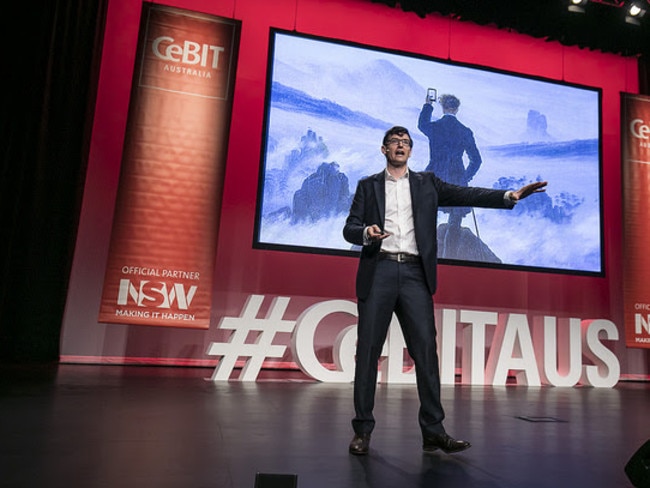How to survive the jobs wipe-out of the fourth industrial revolution
MILLIONS of jobs are expected to be wiped out in coming years — but you don’t have to sit back and take it, a leading economist says.
WE’VE all seen the headlines: millions of jobs at risk as robots take over.
But Nicholas Davis is here to tell you it’s not all bad news, and you can safeguard your future — although it won’t be straightforward or easy.
The Australian-born head of the World Economic Forum’s society and innovation department is in Sydney this week for the CeBIT conference on business and technology.
He says we are in the midst of a fourth industrial revolution in which physical, digital and biological worlds are coming together in ways that could have “scary” consequences.
“The digital revolution has a long way to run still,” Mr Davis said during his keynote speech at the Sydney International Convention Centre on Wednesday. “It’s these new systems that give us hope, but are also incredibly scary.”
While previous industrial revolutions — bringing the benefits of modern agriculture, utilities, manufacturing and computing — had brought about an ever-increasing boost to living standards, he said, the dramatic changes underway right now were not guaranteed to do so.
What the advances in artificial intelligence, robotics, 3D printing, nanotechnology and self-driving vehicles would do, Mr Davis predicted, was “fundamentally change the way we create value and do business, and value ourselves as human beings.”
The risk was that, without updating our social institutions, the tech revolution would create big winners and even bigger losers, threatening to send our standard of living into a tailspin.
THE COMING REVOLUTION
An analysis by the CSIRO last year found that 44 per cent of Australian jobs — some five million positions — were under threat from computerisation and automation, though many workers remain clueless about the big changes on their way.
The picture is even worse in Europe, where the WEF has a crack team of economists working on the issue in Geneva.
“No matter who you talk to about what will happen with the future of the job market”, Mr Davis said, “we don’t know.
“We have instead a series of increasingly interesting, but increasingly challenging, analyses and pieces of data that are making us concerned.”

Self-driving vehicles were expected to put long-distance truck drivers out of business within a decade, he said, while other jobs would be substantially altered.
But, he was quick to point out, “this has always happened”. In the 1950s and 1960s it was the utilities, agriculture and manufacturing industries that took a hit; today it is the services.
According to WEF researchers, 35 per cent of the core skills needed in the workforce will be transformed between 2015 and 2020 due to changes in technology.
Critical thinking, creativity, emotional intelligence and cognitive flexibility will be more important than ever before, as machines take over many of the tasks we currently do each day.
“The issue remains though, you can get a lot of great jobs if you are good at relating to others, also if you are very technical, but what about everyone else?” Mr Davis said. “This is a major challenge for Australia to address.”
LIFE EXPECTANCY SHOCK
One of the most alarming sets of data, he said, was coming out of the United States, the nation whose lead Australia traditionally follows.
Life expectancy in the US — a measure that is supposed to keep gradually increasing — last year marked its first drop since 1993, when HIV-related deaths were at their peak.
The surprise fall, which experts described as “a uniquely American phenomenon” among developed nations, was attributed by some researchers to “the strain of income inequality”.
“The fear is that, actually, rising inequality is pulling us down rather than up,” Mt Davis said.
“It’s a sign that we’re not perhaps delivering the benefits of technology the way we have in the past.”
Ensuring that the benefits of the fourth industrial revolution were distributed fairly was one of its biggest challenges, he said.
“We talk about technology as if everyone leads the privileged lives we do ... There are conversations we need to have, and the big question is, ‘how do we stay human centred?’”
This meant “getting our institutions up to speed”, he said — and rethinking the reliance on jobs to distribute society’s wealth, with the possibility of introducing a universal basic income.
“The Reserve Bank and politicians say it’s a crazy idea, that it would be unaffordable,” Mr Davis said.
“I’m not saying we should adopt it, but we should have a serious conversation about it.”
He said despite the challenges Australians faced, our nation was living in the best time in human development, with the OECD economic development index showing life expectancy, education and income per capita at their peak.
“We’ve gone from $3 a day in the year 1800 to $100 per day in real terms,” he said.
“The beautiful thing about the state that we are in today is that we have the power to create a future we want, but it takes a few things to get there.”




